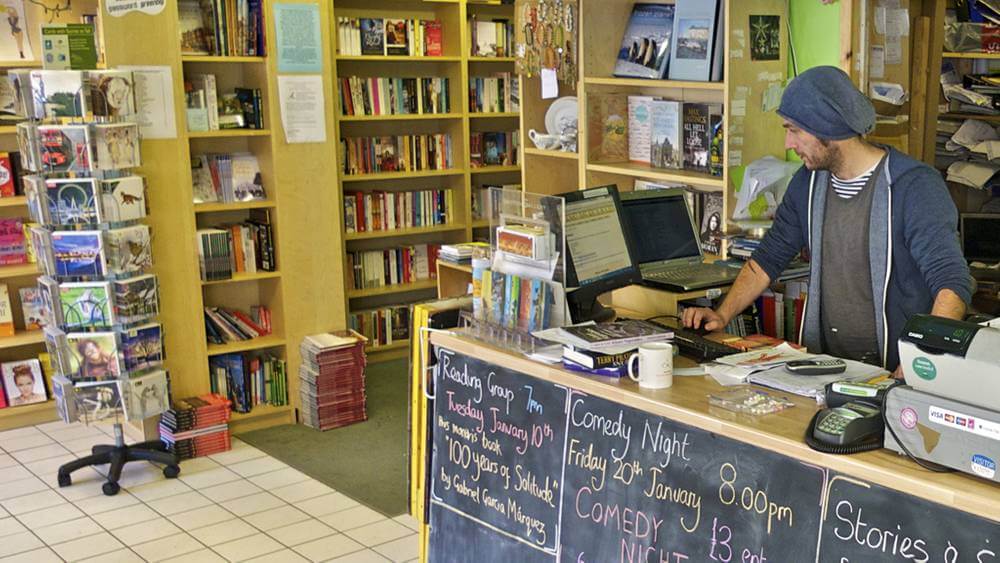With the rise of e-commerce and the convenience of everything being online and available at our fingertips, our lives have been made so much easier. If we feel like ordering food or watching any movie we’d like, we can get it within a matter of minutes. But it has unfortunately been the downfall of certain industries. We saw Blockbuster die when people realised they never had to pick up a physical DVD ever again. Travel agencies on the high street have become increasingly rarer to find due to online deals and ease of booking. Another industry we could see fall in the next few years is physical bookstores. Forever, people have been walking into bookstores to browse the latest releases and pick up a new read. Now, the internet is changing that.
The retail industry has been shaken up by e-commerce, and bookstores are seeing the effects. The number of book sales has drastically reduced in the past four years alone in the UK and shows no signs of rising. So, is it time for bookstores to embrace technology, or can they claw their way back to popularity?
How Healthy are Book Retailers?
Before we find out if they need to embrace technology, let’s first look at the health of book retailers. Are they declining in popularity, or is it all just speculation? One of the most popular book retailers in the US, Barnes and Noble, is slowly dying. They have been forced to close many locations and lay off staff due to decreased sales, and it doesn’t seem to show any sign of revival. However, in places such as the UK, physical book sales have been rising in recent years and showing recovery from a significant slump in previous years, according to the Guardian.
But with such a turbulent market right now, how can book retailers keep their sales healthy? When the e-book first came around, people claimed it was the end of the physical book as we knew it. This did have an immediate effect, but now physical copies of books are on the rise as people put away their screens.
So if book sales are slowly on the rise, why are book retailers such as Barnes and Nobles still failing to stay on top? When it comes down to it, if you don’t keep up with your competitors, you’ll get left behind. Amazon is one of the biggest retailers in the world and book sales are incredibly popular. It has managed to stay relevant as it makes most of its sales online and offers the best deals and titles, and has a fast delivery time. Those who can’t compete with the online market will, unfortunately, fall behind.
How has the Internet Helped?
Amazon has been a major competitor for a number of industries, and the book industry is just one of them. One of the reasons Amazon has been so successful is due to its masterful way of utilising the internet. It has apps, top deals, big-name brands and titles, and fast delivery. A physical store will struggle to compete with this, especially independent retailers who depend on physical sales.
Netflix is another prime example. Back in the day, Blockbuster began as a physical video store where people could go in, choose a movie to rent and take it home with them for a few days. It was fun and at the time was the best way to see new releases as they came out. But then the internet came around, and video sales took a massive hit once people realised they could get movies online without leaving the house. It was time to adapt or die, and Netflix chose to capitalise. They utilised the internet first to offer mail-order rentals and then to become one of the world’s biggest online streaming service for both movies and TV shows with over 118 million subscribers worldwide. Sadly, Blockbuster didn’t adapt, and instead went bust as the internet took over the industry, and now you may see another Blockbuster store again.
Another example of this is playing bingo. Since the 50s, bingo halls were hugely popular and would be packed to capacity with people vying to win. They were places to be social and it was the only way to play the game properly and win some money. But the internet quickly saw to the decrease in popularity of bingo halls. It became less popular and it seemed as though the industry was coming to an end. However, the internet breathed new life into the industry with popular sites like Wink Bingo offering different variants of the game and now it is more popular than ever with over 22% of all online gambling in the UK coming from online bingo!
If bookstores can use the internet to keep ahead like these, they may be able to rise to the top once again.
Which Bookstores Can They Learn From?

Bookstores need to use the internet and digital services to stay on top. But which ones can they look towards for inspiration? An obvious example is, of course, Amazon. Amazon sell both physical and digital copies of books for people to enjoy on their e-readers. Amazon and Google e-books are two of the most popular e-book retailers, and one reason is that they can be read instantly without having to go out and buy a book. Amazon e-books are often cheaper to buy, and a lot of them are available to read before the physical books are released.
Waterstones is one of the biggest UK book retailers and they also offer e-books to their customers via their online store. They offer books for Kobo, the Amazon e-book service. By doing this, they work alongside their competitor to make sales and stay on top of their game. Audiobooks are also very popular, with sites like Audible leading the way and being a big-name online retailer.
How Can Book Retailers Stay On Top?

By adapting to the latest trends and making their titles available in digital formats, book retailers have a good chance of staying afloat. If they can make their websites an extension of their physical store, they can make more sales and offer more variety of reading options to their customers. If they can keep up and meet customer demands for online copies and better convenience, they stand a greater chance for success.
Michael Kozlowski is the editor-in-chief at Good e-Reader and has written about audiobooks and e-readers for the past fifteen years. Newspapers and websites such as the CBC, CNET, Engadget, Huffington Post and the New York Times have picked up his articles. He Lives in Vancouver, British Columbia, Canada.

